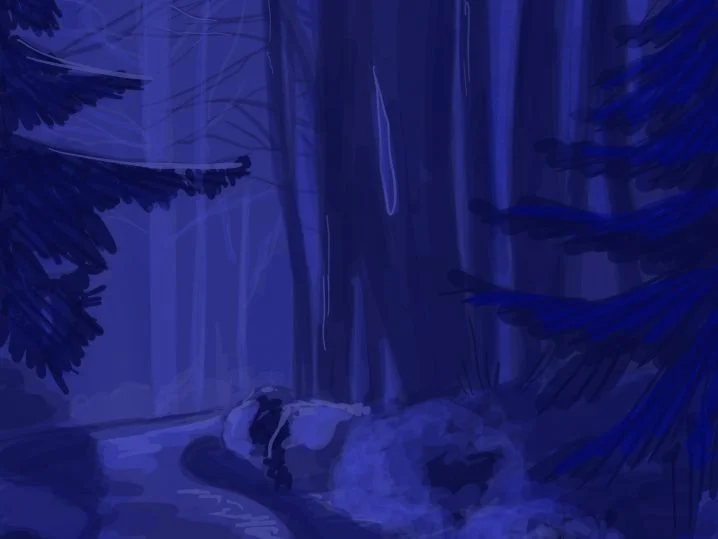A FIELD GUIDE TO GETTING LOST: ABOUT FINDING YOURSELF
MAY 26TH, 2022
Illustration by: Kristel Jaago.
Learning to live with stillness is something that many of us might have learned in the past two years. In my last article on rebuilding relationships with oneself and others post-pandemic, I observed that it can often be all too easy to become tied up in an abundance of social obligations, eventually losing sight of ourselves.
But what if getting lost is also a way of finding oneself in times of uncertainty? In this short-written piece, I will introduce you to one of the books that has coloured my perception of life beautifully.
A FIELD GUIDE TO GETTING LOST
Have you ever wondered why tragedies seem more beautiful and meaningful than comedies? And why we can experience great relief and pleasure in the misfortune of songs and stories? (Solnit, 31). In A Field Guide to Getting Lost, Rebecca Solnit takes us on a trip through tales about history, philosophy, the colour blue, longing, and distance to cast a new light on the concept of loss, losing, and being lost.
All three words carry many different connotations and ways of interpreting them. Without diving too deep into the etymology of the word ‘lost’, I will trace and appreciate the threads of meaning and beauty that Solnit weaves into her musings on the subject.
BLUE IS FOR LONGING
During summer, the shimmering of the sun turns water into a mesmerising colour of blue. Blue reminds me of the sky, a colour I know so well and feel all around me, yet somehow remains far away. Where land and sky meet, it fades into a deeper shade of blue and represents a colour of longing, wanting to reach for it in vain. Solnit alludes that the colour blue is symbolic of the desire for distance, a place which is endless, and unreachable (Solnit, 30).
Desire can be a difficult feeling, especially when the object of desire is acquired but the expected fulfilment has not come with it. Blue fades, blue slips through our fingers, blue is always out of reach. When reaching for the blue of distance, the colour seems to be elusive. We’ll want to catch up with it constantly but are helplessly tracing behind.
Instead of trying to reach the horizon for the colour blue, Solnit proposes a different approach to the feeling of desire and contemplates whether it is something that can be cherished on its own. She invites us to take a seat and admire the deep and endless tints of longing, something as inherent to human life as blue is to distance (Solnit, 30).
FINDING COMFORT IN BEING LOST
When I first started reading her book, the days were short, and the evenings were restricted by a curfew. It was mid-February, and a life filled with parties and going out seemed far away. I suddenly felt very old. Was this not supposed to be the ‘time of my life’?
Rebecca Solnit has offered me some insights with her beautiful writing that helped me accept the disappointment and sadness over a period in my life when I felt lost.
I came across a paragraph in her book that perfectly captured the feeling of uncertainty and difficulty I encountered during the pandemic. She mentions sadness as a means of experiencing the depths of our lives, and wonders whether there is beauty to be found in the emotions we often suppress, such as pain and loneliness (Solnit, 119).
Solnit illustrates how Rock n’ Roll songs represent the young and the rebellious and provide us with a sense that the world is lying at our feet. She contrasts it to country music, which treats themes like growing up, and eventually having to settle down. Country music is more emotional than Rock n’ Roll, filled with hardships and the knowledge that it sometimes takes hard work to keep going. Solnit says that it teaches us a deeper understanding of ourselves because we learn the most when we struggle by climbing up again when we are down (Solnit, 119).
CHERISH THE GOOD, MAKE SPACE FOR THE BAD
I do not intend to romanticise feelings of difficulty and pain. However, reading Solnit’s suggestions of embracing the discomfort of being lost, has offered me solace in knowing that what I feel has been felt by many others before me, and will be felt by millions of people to come.
After a few years of climbing mountains of silence and precarity that did not seem to stop, I have learned to feel comfortable with the emotional depths of my life, making me appreciate the sounds of Rock n’ Roll even more. A Field Guide to Getting Lost has taught me how to cherish the good and make space for the bad.
I might be scared to get lost, but I also know that the unknown carries pleasures and fulfillments yet to be discovered. And on that note, I would like to end with one of my favourite quotes from her book: “that thing the nature of which is totally unknown to you, is usually what you need to find, and finding it is a matter of getting lost” (Solnit, 6).



